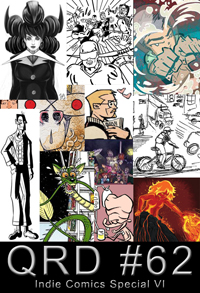
 |
| about
this issue Indie Comic Creator Interviews: Jay Payne Steven Myers William Dean Blankenship, Jr Ted Intorcio Lucas Herr Troy-Jeffrey Allen Jeff Gibbons Brian Hagen Nils Balls Eric Grissom Eric Ratcliffe Steve Peters |
 |
 |
 |
 |
 |
 |
 |
|
|
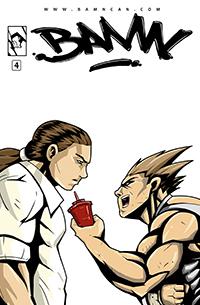 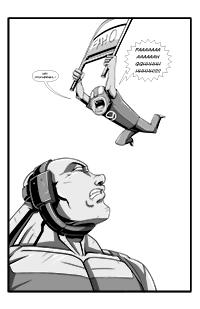 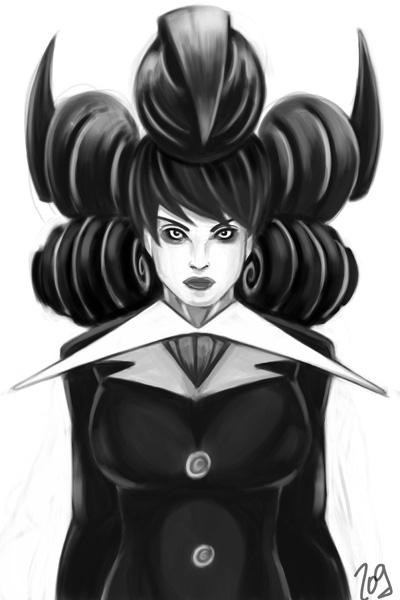 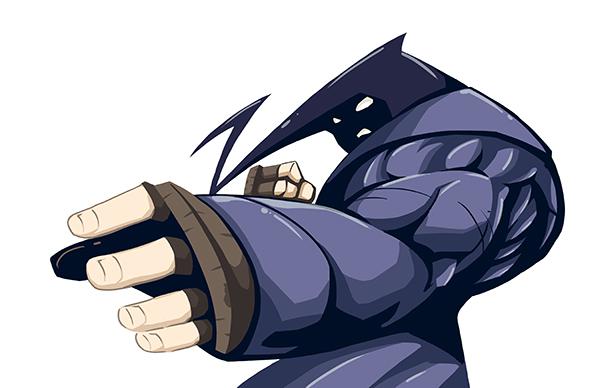    |
May 2013

City: Washington, DC
Comics: Bamn, Dr. Dremo’s Horrors of War, Dr. Dremo’s Spoils of Crime, District Comics, & Boogie Monster
Websites: www.wearemoka.blogspot.com
QRD – How old were you when you first got into comics & did you always stick with them or did you come back to them?
Troy-Jeffrey – I honestly couldn’t tell you the exact age. My earliest memory was an anti-drug Marvel Comic. It had Powerman, Storm, & Spider-Man on the cover. I remember holding on to it, being mesmerized by this thing called a “comic book,” but never actually reading it. It explains a lot about my college years. After that, it was Ninja Turtles for a long time. Once Archie started making age-appropriate TMNT comics…that was it. That was the gateway drug. I switched over to Marvel right before the X-Men cartoon in the 90s. Once that happened, I was pretty much reading EVERYTHING Gareb Shamus told me to read. Then that ugly late-90s period hit. I stopped reading & didn’t pick it back up until the Bryan Singer X-Men movie in 2000. For some reason I left the Marvel books alone though. I discovered Preacher & Authority. It wasn’t until those creators (Ellis, Ennis, Millar) transitioned into the Big Two that I started reading Marvel & DC again. Preacher ruined me though. I needed that edginess in everything. I stopped following characters & just followed writers then.
QRD – What was the first comic book you ever bought?
Troy-Jeffrey – It was The New Archies. I don’t remember which issue. I just recall being really taken by the concept of a comic. I didn’t care what it was; I just liked the feel of it. I definitely had a lengthy Archie phase.
QRD – How old were you when you put out your first comic?
Troy-Jeffrey – 27. Bamn is my first comic. I look at it now & I can tell, too. Don’t tell anyone, but we recently went back & cleaned up some of it.
QRD – What decade do you think produced the best comics?
Troy-Jeffrey – For me, I’m going to say the early 2000s. I think that was the one era where everyone was doing something interesting. Marvel had their Ultimate line, DC was imprinting stuff like Planetary & 100 Bullets, Brian Wood was doing Couriers.… Damn. Comics were just so crazy. Everything was salty & counter-culture. Frederic Wertham would’ve crapped his pants.
QRD – Do you see mini-comics & indie comics as paths to mainstream comics or as their own unique media?
Troy-Jeffrey – I have ideas that lean in both directions. I love when comics are weird, but I understand the importance of mainstream exposure. Misfit adults need to be entertained & kids should be allowed to enjoy Spider-Man without having to rub elbows with the misfit adults, y’know? I guess what I mean is...indie books have a place for the horrible things I want to say. Mainstream comics are more important to solidifying a future fan base. One feeds the other.
QRD – How many copies of your comic do you print in your first run?
Troy-Jeffrey – Around 100, I think.
QRD – How much do you think comics should cost?
Troy-Jeffrey – Ugh. That’s THE question, right? Comics were created to be disposable distractions. Like the newspaper. You get it, you read it, you move on. That being said, the prices should reflect that more. I don’t know what the price point should be, but we’ve held the line on Bamn at $3.00. It’s been $3.00 since 2008. Comic books shouldn’t cost too much. Regardless, I think that’s where print comics are heading.
QRD – How many books do you produce a year & how many would you like to?
Troy-Jeffrey – I can only muster a comic & a short story a year. I have a full-time job. I hate that it’s all I can do. After working 9 to 5, sometimes a page of script can take a week to complete.
QRD – Do you think stories should be serialized or delivered as complete works?
Troy-Jeffrey – I say serialize online & then collect them once you’ve got a trade’s worth of comics. Paper is becoming unsightly to me now, but I do understand the need to own something you love instead of letting it exist as data that can disappear into the internet netherworld at any time.
QRD – How are comic strips different than comic books & which medium do you prefer?
Troy-Jeffrey – The arcs are different. Charlie Brown can keep falling for the football gag & that’s his big character moment. I’ve done strips. It’s tough for me to condense info into just a few panels. I prefer comic books. More wiggle room to develop the drama & action within a story? I’m big on long set ups that build to a pay off. I can’t do that with a strip.
QRD – How long is it from when you start a comic until it’s printed?
Troy-Jeffrey – Six months.
QRD – What do you do better with your comics now than when you first started?
Troy-Jeffrey – When I first started it, I just wanted to offend everyone. Now, I want it to feel like that TMNT comic from my childhood: Polished, complete, & harmless.
QRD – What does your workstation look like?
Troy-Jeffrey – A movie poster over the laptop on a sizable desk, with convention badges & a dry erase board hanging nearby. I’m tucked away from my girlfriend & the flatscreen TV behind a big Ikea bookshelf.
QRD – What do you think of digital comics & webcomics?
Troy-Jeffrey – It’s inevitability. Like I said, paper is starting to gross me out. I consume information like crazy. Before the digital age, that would mean piles of textbooks, comics, & National Geographics around the apartment. I’ve always been a neat freak so there is something very unappealing to me about that. Housing comics as data makes it feel less like hoarding.
QRD – Do you prefer working in color or black & white?
Troy-Jeffrey – I’m kind of fond of black & white. I keep fighting to keep Bamn in black & white. The irony is that it’s probably easier to just color the damn thing.
QRD – How many different people should work on a comic & what should their jobs be?
Troy-Jeffrey – Three. Writer, artist, editor. The rest are just greedy people or fanboys who should be making slash fiction instead of wasting your time.
QRD – How tight do you think a script should be as far as telling the artist what to draw?
Troy-Jeffrey – It depends. Emotional specifics are important. If a character is having a moment then you need to get the artist there. If it’s just a scene of exposition or action then it’s easier to just let the artist be.
QRD – What comic book person would you be most flattered to be compared to?
Troy-Jeffrey – Warren Ellis. The guy just keeps writing. It has to be Adderall.
QRD – What do your friends & family think of your comics?
Troy-Jeffrey – My mom thinks it’s cute, like something you’d post on the refrigerator. My girlfriend likes it so much that she wants to make one with me. That’s the thing, people genuinely like comics. It doesn’t have to be a hard sell.
QRD – What do you think of superheroes?
Troy-Jeffrey – It’s the gateway. Don’t knock it. No kid is going to pick up Clowes or the Hernandez Brothers first. He wants the friggin’ Avengers. Superheroes future-proof this industry.
QRD – Marvel or DC?
Troy-Jeffrey – Marvel.
QRD – What comic characters other than your own would you like to work with?
Troy-Jeffrey – I have one Spider-Man story in me. Heroes for Hire has always been interesting to me too.
QRD – Ideally would you self-publish?
Troy-Jeffrey – How else will I get these ideas out? Cute & cuddly stories are fine & all, but sometimes you need to exorcise those demons by making a comic about it.
QRD – What conventions do you try to attend & why?
Troy-Jeffrey – SPX & Baltimore are local. They were our first brush with the larger idea of comics. Can’t beat that. It’s a loyalty thing.
QRD – What do you do to promote your books?
Troy-Jeffrey – I go to conventions & do a lot with social media. There really has to be more to it, though. If you know it, please share.
QRD – Do you think your comics are well suited to comic shops or would sell better elsewhere?
Troy-Jeffrey – Comic shops are a great place to commune, but for the most part they aren’t useful to anyone not backed by Time Warner or Disney. I mean, look at the shelves. It’s like walking into a room filled with billboards. Bamn can’t survive next to Batman.
QRD – What other medium would you like to see some of your comics made into (television, film, games, action figures, etc.)?
Troy-Jeffrey – I’d be a liar if I said games & film weren’t appealing. I went to school for film, so that’s always in the back of my mind when I’m writing.
QRD – Do you consider yourself a comic collector or a comic reader or both?
Troy-Jeffrey – Reader. Collecting is a young man’s game.
QRD – What do you see as the most viable mediums for comics distribution 10 years from now?
Troy-Jeffrey – Online & convention tables. Social media has proven that selling yourself to the audience is as important as selling the product. You make friends & fans online & then you make friends & fans at the cons. Accessibility is & will continue to be key.
QRD – What would you like to see more people doing with comics?
Troy-Jeffrey – Marvel has the right idea, but they ultimately are only out for themselves. Understandably so. Again, it’s time to become more accessible. More kids’ books, more female-driven titles, less laborious continuity, & fewer indie comics about your bizarre sex fantasies. Let the idealism die a little. We’ve been singing the same tune for too long.
